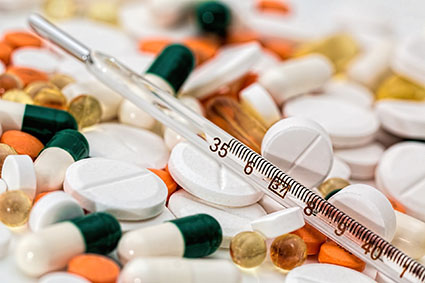by WorldTribune Staff, May 7, 2023
More anti-psychotic drugs are prescribed to trans-identified adolescents after their transgender treatments than before, according to a study.
The 2021 study, published in the Journal of Sexual Medicine, examined the Department of Defense (DoD) medical records of 3,754 trans-identified adolescents and 6,603 siblings who did not identify as transgender. The findings reveal no improvement in mental health after commencing hormone interventions and an increase in prescriptions for psychotropic medication.
 The study also found no significant psychological benefit to transitioning, but did find that many children had their psychotropic medication increased after gender-related drugs were administered.
The study also found no significant psychological benefit to transitioning, but did find that many children had their psychotropic medication increased after gender-related drugs were administered.
“Among 963 [transgender] youth using gender-affirming pharmaceuticals, mental healthcare did not significantly change and psychotropic medications increased following gender-affirming pharmaceutical initiation,” the study said.
The trans-identified were more likely to have a mental health diagnosis, use more mental healthcare services, and be prescribed more psychotropic medications compared to their non-trans siblings, the study found.
“The most pronounced increases in mental healthcare were for adjustment, anxiety, mood, personality, psychotic disorders, and suicidal ideation/attempted suicide,” the study noted. “The most pronounced increased in psychotropic medication were in SNRIs, sleep medications, anti-psychotics and lithium.”
Still, one of the authors of the study, Dr. David Klein of the David Grant Medical Center at Travis Air Force Base, said he remained hopeful that, over time, the preexisting serious mental health issues could just “melt away” after the adolescent undergoes sex change interventions.
In an interview with the Urology Times, Klein said that, at first glance, it appears from looking at the study that transgender people are more likely to suffer from psychotic conditions such as schizophrenia, but he suggests that perhaps the anti-psychotic drugs are being prescribed as “adjuncts for severe depression or for insomnia, as opposed to a primary psychotic condition.”
Klein went on to say that rather than there being something inherent about transgender people that makes them more prone to psychotic disorders, it’s more likely that once a medical sex change is underway, their other diagnoses will “start to melt away over time.”
The Post Millennial’s Mia Ashton noted: “Many proponents of adolescent sex changes argue that the high rates of coexisting mental health issues observed in youth who identify as transgender are the result of the pain of being trapped in the wrong body. The solution, they believe, is to alter the body, then all preexisting mental health issues will disappear.
“An alternative theory is that when distressed youth with serious mental health issues come across the concept of gender online or at school, they latch onto the idea that they could be transgender and see a medical sex change as the answer to all their woes.”
Klein was also the co-author of a paper that suggested children as young as 7 were capable of consenting to medical sex changes. The paper called the cautious psychotherapeutic approach of “watchful waiting” for children who suffer from gender dysphoria “conversion therapy.”
Dr. Stanley Goldfarb, of Do No Harm, an organization of healthcare providers seeking better care for minors suffering from gender distress, told Fox News that “the notion that 7-year-old children are capable of such decisions is beyond laughable. The existence of a large, perhaps as much as 25 percent cohort of ‘detransitioners,’ suggests the folly of assuming the soundness of childhood decisions. Just because a child states that they understand the implications of gender transitioning does not mean that they can conceive of their future regret.”
Goldfarb added: “These physicians should examine the literature and face the reality that the reason that Finland, Norway, Denmark, and the UK have opted to severely restrict the use of puberty blockers and sex-characteristic altering hormones is that we have little if any evidence that we are not hurting more children that we are helping.”
Membership . . . . Intelligence . . . . Publish
